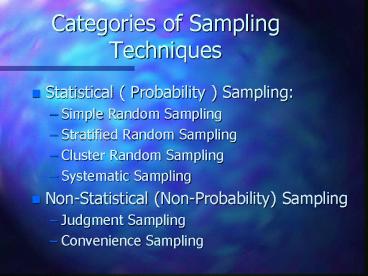Categories of Sampling Techniques - PowerPoint PPT Presentation
Title:
Categories of Sampling Techniques
Description:
Categories of Sampling Techniques Statistical ( Probability ) Sampling: Simple Random Sampling Stratified Random Sampling Cluster Random Sampling – PowerPoint PPT presentation
Number of Views:125
Avg rating:3.0/5.0
Title: Categories of Sampling Techniques
1
Categories of Sampling Techniques
- Statistical ( Probability ) Sampling
- Simple Random Sampling
- Stratified Random Sampling
- Cluster Random Sampling
- Systematic Sampling
- Non-Statistical (Non-Probability) Sampling
- Judgment Sampling
- Convenience Sampling
2
Simple Random Sampling
- Simple Random Sampling is a method of selecting
n units out of a population of N such that every
one of the NCn distinct samples has an equal
chance of being drawn. - P(any sample of n from a population of N) is
equal to the reciprocal of NCn.
3
Stratified Random Samples
- In stratified sampling, the population of N
units is first divided into sub-populations of
N1, N2, NL units, respectively. These
sub-populations (strata) are non-overlapping, and
together comprise the whole of the population, so
that N1N2NL N When the strata have been
determined, a sample is drawn from each stratum.
The sample sizes within the strata are denoted by
n1, n2, nL
4
Cluster Sampling
- Cluster sampling is a method by which the
population is divided into groups, or clusters,
and a sample of clusters is taken to represent
the population. Clusters should be
representative of the entire population. - The objective is to form groups of clusters that
are small images of the target population.
5
Systematic Sampling
- For systematic sampling, elements of the
population are categorized in some way (such as
alphabetically or numerically) and a random
starting point is selected. Then every Nth item
of the categorized population is included until
the sample size n is satisfied.































